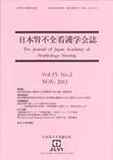Japanese
English
- 有料閲覧
- Abstract 文献概要
- 参考文献 Reference
本研究の目的は,血液透析施設に勤務する看護職者の死生観および関連要因を記述相関的に明らかにし,透析患者の終末期支援を検討するうえでの基礎的な知見を得ることである.A県の病院以外の全透析施設に勤務している754名の看護師を対象に,平井ら13)が開発した死生観尺度と独自に作成した自記式質問紙で無記名調査を行い郵送にて回収した.死生観尺度と属性との分析には,2群間ではt検定,3群以上では一元配置分散分析,死生観尺度と質問項目間の関連はスピアマンの順位相関を用いて分析を行った.回収数485(回収率64.3%)のうち有効回答478を分析した結果,対象者の死生観は死について考えることを避けず,死をこの世の苦しみなどからの解放だとは考えない傾向にあり,死への関心と死に対する恐怖や不安に高低はない結果であった.死生観尺度の「死への恐怖・不安」(t=-2.04,p<0.05),「死からの回避」(t=-2.61,p<0.01)の2因子と看護職免許との間で差を認め,准看護師は看護師より死に対する恐怖や不安を感じ,死について考えることを回避したいと感じていることが明らかになった.さらに,死に関する語り(ρ=0.198~0.247,p<0.01)は死への関心と正の相関関係にあった.今後,透析患者の終末期看護に向けて准看護師への支援とともに,死について語り合える看護職者どうしのピア・サポートの必要性が示唆された.
Purpose: The objective of the present study is [1] to clarify dialysis nurses' thanatopsis (i.e. views of life and death) and its related factors in terms of descriptive-statistics, and [2] to gain the basic knowledge of end-of-life support for dialysis patients.
Method: A quantitative-descriptive approach is employed in the research, targeting on 754 nurses working in non-hospital institutions providing dialysis treatment in A-prefecture. Date elicitation was done in the form of single-blind questionnaire, using the diagnostic standard for views on life and death developed in Hirai et al (2000); the result was retrieved via airmail. Of the 485 overall responses, 478 valid ones have been analyzed statistically:t-test and one-way ANOVA method were used regarding the correlation between thanatopsis and attributes of the participants; Spearman's rank-order correlation in analyzing how thanatopsis and each question were correlated.
Result: It became clear that there is a tendency that the nurses: [1] do not avoid thinking of death, [2] do not regard death as something that might lead to liberation from sufferings, and [3] are not significantly interested in death. It was also found that in terms of the two factors `fear of death' (t=-2.04, p<0.05) and `avoidance of death' (t=-2.61, p<0.01), there is a significant difference between nurses and practical nurses: practical nurses are more likely to feel fearful of and to avoid thinking of death. Furthermore, talking about death is positively correlational with their interest in death (ρ=0.198~0.247, p<0.01).
Conclusion: It was suggested that it is necessary to provide support for practical nurses and peer support for nurses to talk about death.
Copyright © 2013, JAPAN ACADEMY OF NEPHROLOGY NURSING. All rights reserved.


